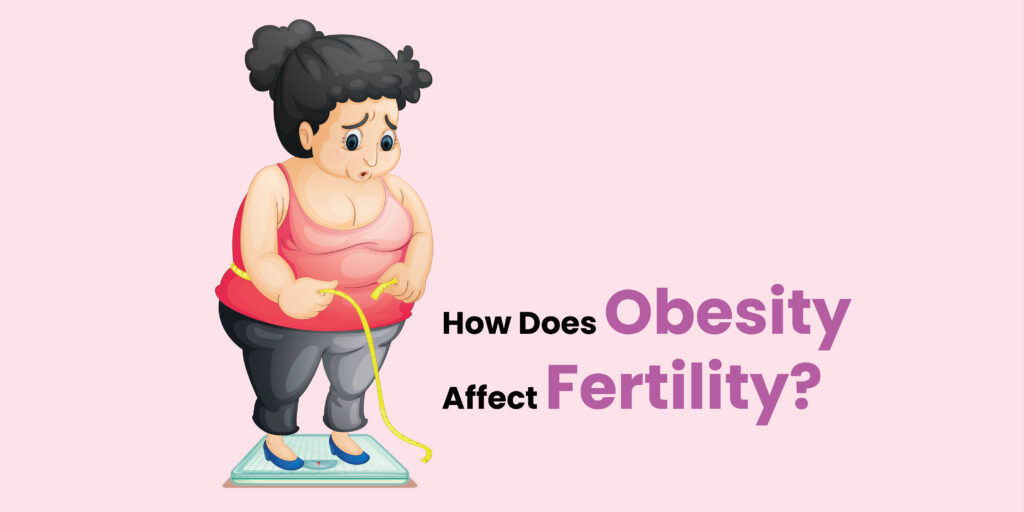Overweight and obesity are on the rise and are now a global epidemic. All systems, including reproductive health, are adversely affected by obesity. Obesity is one of the most prevalent and well-known risk factors for infertility in both men and women. Your chances of getting pregnant and having a healthy pregnancy and baby can both be increased by losing weight.
What is obesity?
Excessive fat accumulation that poses a health risk is what defines overweight and obesity. The parameter used to identify obesity is Body Mass Index (BMI), which is calculated by dividing a person’s weight in kilograms by the square of their height in meters. Obesity is diagnosed when a person’s BMI reaches 25 or higher.
Obesity and infertility in females
The menstrual cycle is regulated by a precise hormonal balance. Women who are overweight or obese have greater amounts of leptin, a hormone produced in fatty tissue. This may affect the balance of hormones and lower fertility.
Through a variety of hormonal mechanisms, the amount and distribution of body fat influences the menstrual cycle. The likelihood of having reproductive issues increases with increased weight and abdominal fat.
Obesity in women can result in an overproduction of insulin, which could lead to irregular ovulation. Additionally, there is a connection between polycystic ovarian syndrome (PCOS), a disorder that causes infertility, obesity, and excessive insulin production.
PCOS, a specific medical disorder, causes irregular menstrual cycles, decreased or interrupted ovulation (anovulation), obesity, and increased levels of male hormones.
Obesity may also have an impact on endometrium.
Many overweight women continue to ovulate. However, it appears the eggs they produce are of lower quality.
Obesity and infertility in men
Obesity can cause an increase in body temperature, particularly around the scrotum area.
Hormonal imbalances can result from obesity. In addition to having lower levels of sperm-producing hormones like androgen and inhibin-b, obese men are more likely to have greater estrogen levels.
This may affect sperm quantity, sperm quality, and sperm swimming ability.
Excess fat transforms the male hormone testosterone into estrogen, and these estrogens reduce the stimulation of the testicles.
Hormones
Excess body fat also affects the gonadotropin-releasing hormone (GnRH), which is crucial for normal ovulation in women and the generation of sperm in males. GnRH triggers the release of the luteinizing hormone (LH) and follicle-stimulating hormone (FSH), both of which are essential for the production of eggs and sperm.
Complications
Obese women face challenges when getting pregnant and having a successful pregnancy. They have lower chances of implantation and getting pregnant. If they do get pregnant, they have higher rates of miscarriages and pregnancy complications.
Obese women have a reduced likelihood of conceiving after assisted reproductive technology (ART), require greater dosages of gonadotropin, respond poorly to ovarian stimulation, and have a higher risk of miscarriage, making it challenging to treat anovulatory infertility in these women.
Furthermore, they are at a higher risk of giving birth to babies who suffer from birth problems such as heart defects and neural tube defects (NTDs). Additionally, obese pregnant women are more likely to experience most pregnancy problems, such as gestational diabetes mellitus (GDM).
Conclusion
With many other co-morbid problems, including infertility, obesity is a serious health concern. According to studies, weight loss is quite helpful in treating these people, can improve fertility, and result in successful full-term deliveries. If obesity is the reason you’re having trouble getting pregnant, it’s a good idea to deal with that first before trying fertility treatments. Moreover, addressing obesity can significantly improve your chances of successful fertility treatments down the line. Additionally, have a talk with your doctor about how your weight might affect your ability to have a baby.
Watch Below Video to more information:
